HOT HYGIENE
Livin’ it up at hotels where clean is queen
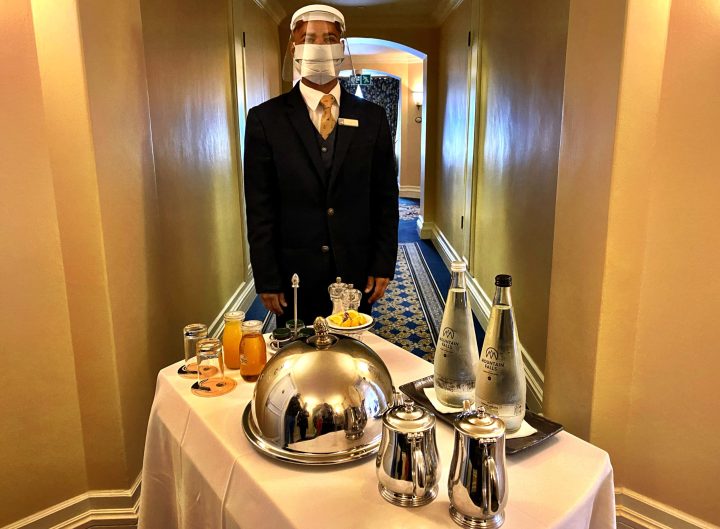
Now that South Africa has unlocked Level 2 of lockdown, intra-provincial leisure travel is allowed and hotels are eager to welcome guests back. Extensive health and safety procedures are being implemented to ensure visitors’ comfort – and confidence.
Blast from the Past is a 1999 movie starring Brendan Fraser, Christopher Walken and Sissy Spacek. Short story: the dad, a nuclear scientist, believes war with Russia is imminent so he builds an underground bunker where he takes his family to live, time-locked for 35 years. When the son eventually emerges, he finds a world very different to the 1960s culture with which he was brought up.
This reminds me a bit of our current lockdown situation. For months, we were urged to stay at home, but as restrictions have gradually lifted, we’re coming out into a very strange environment. We know – or at least, we should – that Covid-19 is not over, but you’d think that it is; that it was just some horrid nightmare from which we’ve recently awoken. People – so many people – are still walking around in public without masks. They socialise in bars and restaurants, with zero physical distance, as in hugs and embraces. The shops are crowded, 50 people look like a lot more than they sound on paper, and rush hour traffic has returned, ugh. It’s all anxiety-inducing for anyone who has thus far remained fairly self-isolated, and it transpires that some people think your request to have your personal space respected is a joke.
Life, however, since we should be grateful to have it, must go on. I know I’ve said this many times to many people so forgive me if I am repeating it now: we all have our own personal requisite comfort levels. Since my first lockdown weekend away in Stellenbosch at the end of July 2020, I’ve been to a further three guesthouses, and I grow increasingly confident with each trip. Yes, all right, I do still take my own sanitiser but I’m definitely not as skittish as I was.
Slowly but surely, hotels are gearing up to reopen, some sooner than others, and they have been hard at work during the past few months making sure they are doing everything possible to help their staff and guests feel secure when the time arrives. “What’s important to us is that the staff feel comfortable and can talk with confidence – and then the guests will feel safe,” said Joanne Selby, GM of The Table Bay hotel in the V&A Waterfront.
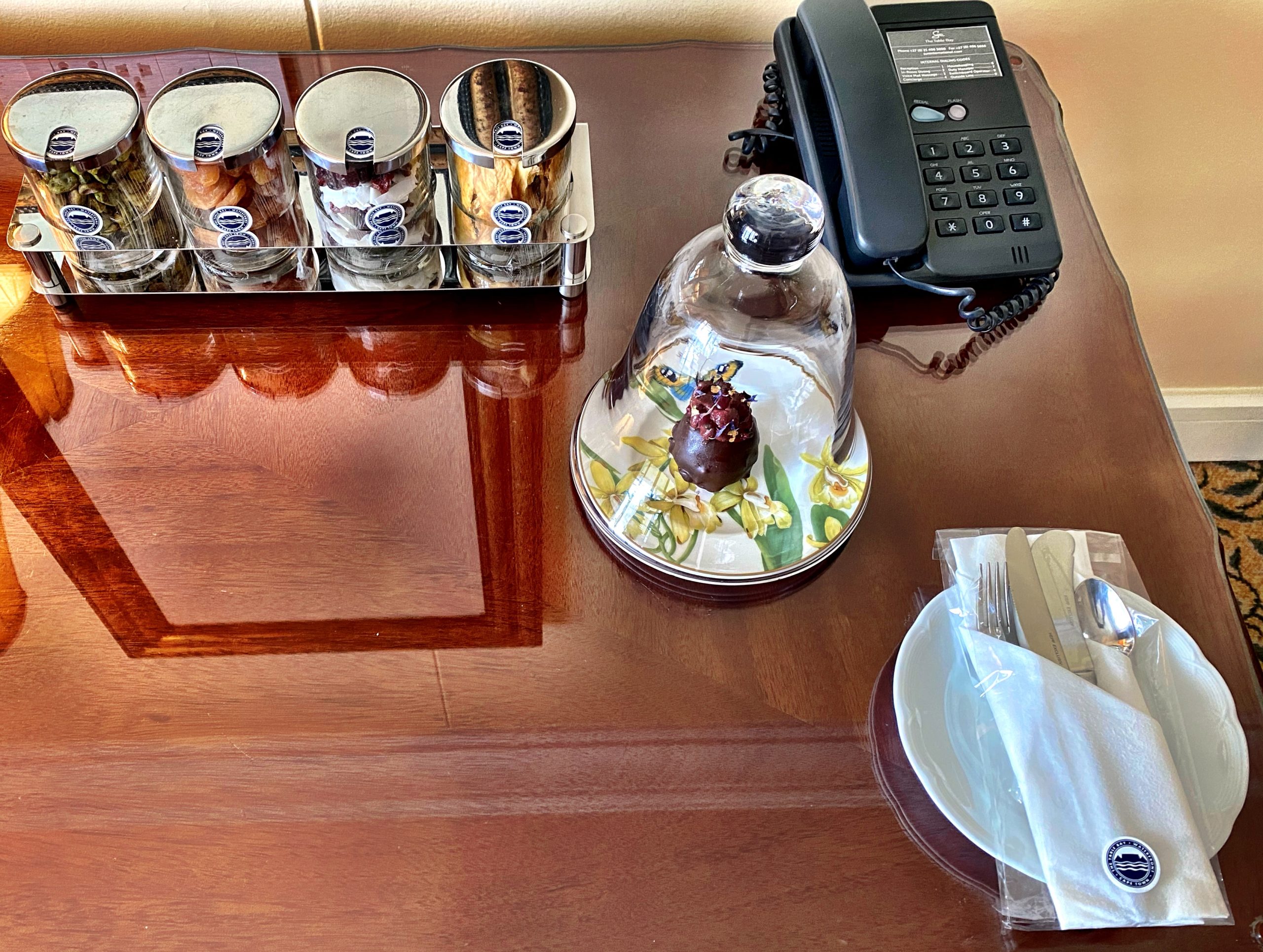
An example of what guests will find in their rooms when they check in at The Table Bay from November 1, 2020. (Photo: Bianca Coleman)
“We are hopeful that the curfew will soon be relaxed as it has hurt our business by reducing operating hours at a time when numbers at our properties already have to be limited. But we are grateful and relieved that our restaurants can again serve alcohol,” said Sun International Group Hospitality COO Graham Wood.
“Our current health and safety protocols will remain in place, and all Sun International properties now bear the World Travel and Tourism Council’s (WTTC) safe stamp of approval, verifying that the Covid-19 health and safety protocols we have in place meet international benchmarks.”
The Sun City resort has already opened and The Maslow Sandton will open on October 1, followed by The Table Bay on November 1, 2020.
Properties in the group are following the guidelines of the Tourism Business Council of South Africa, a document being used by all the big players in terms of the minimum standards in the industry, said Selby. “We’re probably doing a little bit more. I think it needs to become part of our DNA for the foreseeable future.”
Measures include walk-off mats at all the major entrances to the hotel – the front, the back which leads to the quayside, and at the top of the escalators which lead to the shopping mall. These follow a dry-wet-dry procedure which will remove the last dregs of “outside” contaminants. “Theoretically, they’ll have masks on, hands will be clean, their luggage will be sanitised. And their shoes too. It’s not invasive and will give an additional sense of comfort,” said Selby.
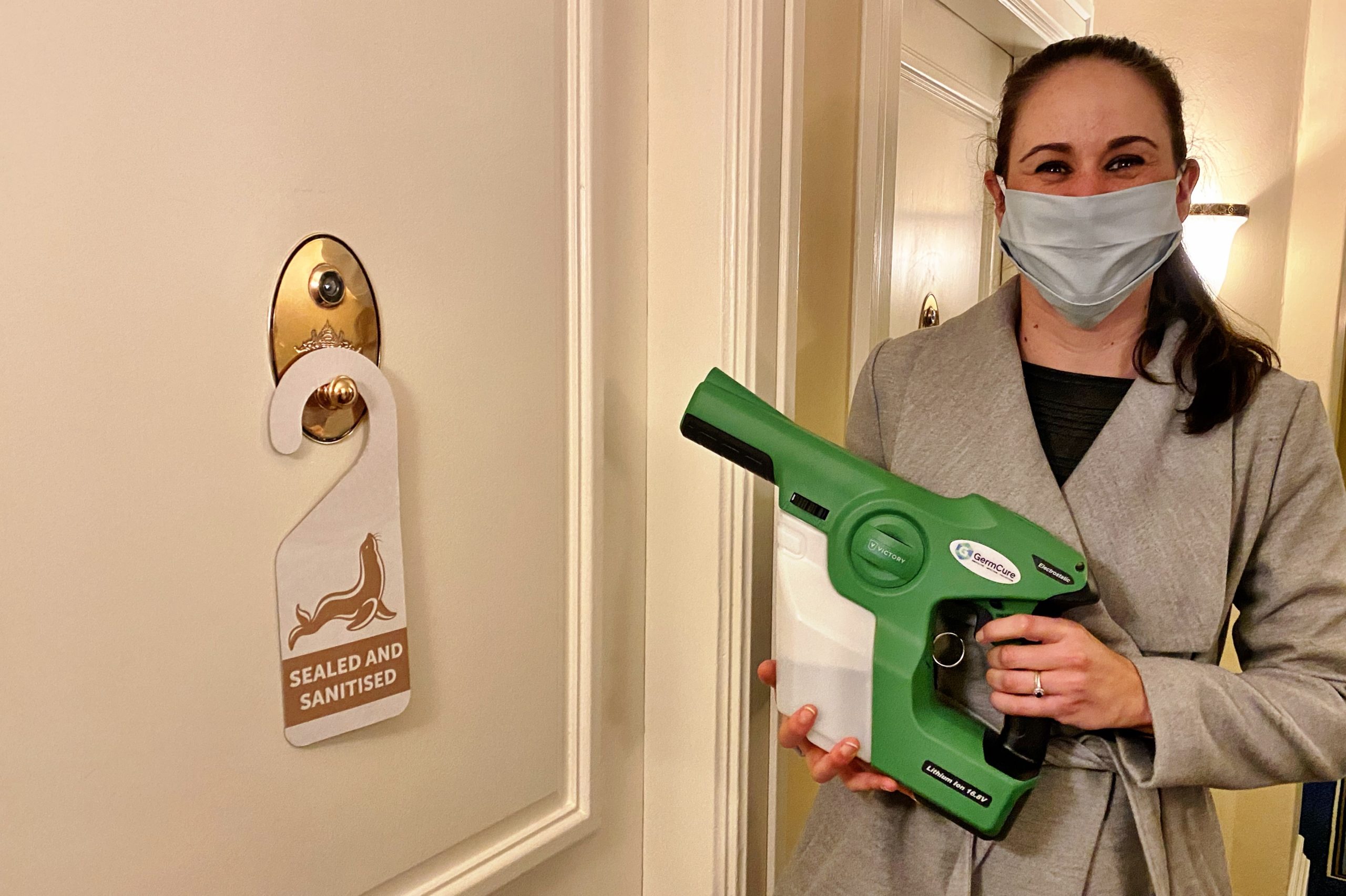
Executive housekeeper Melissa Hugo with an electrostatic sanitising ‘gun’. (Photo: Bianca Coleman)
All staff members have to complete a comorbidities questionnaire to make sure it is safe for them to come to work. “Based on that, we get doctors to make sure they are fit to work, if they need to work in a specific area, and how we accommodate those requirements in the workplace,” she said.
Then there are four training modules, from mask protocols to cleanliness to hygiene, to rules of engagement in terms of social distancing. About half the staff have completed this training so far. Only once they have done this, can they get in a vehicle and come to work. But wait, there’s more: an online self-assessment has to be done every day, and presented on arrival at work. It will show a red screen, or a green screen, and guests will be required to carry out the same assessment.
“A red screen means you might be denied access or deferred to a holding area for further analysis,” said Selby. Those cleared will still have their temperatures taken and hands sanitised before beginning their shift.
“If your temperature is high, then we will take you to a secondary area – the first conference room, that’s our Covid holding room – where we’ll have another, differently calibrated, thermometer and oximeter. There will be more in-depth screening and questions before check in is allowed, or a referral for a second opinion; we’re not medical professionals,” said Selby, because statistically, there is always a chance someone will get sick.
Check-in, wherever possible, will be contactless. Where a stanchion and a guard once stood at the lifts, they will be replaced with glass sliding doors with key card access. Escalators to the mall will be open, with the walk off mats at the top, and users will be required to leave two steps distance between themselves and others on the escalator.
Guests will be given the option of whether they’d like their rooms serviced or not. If not, there are self-cleaning kits with disposable cloths, and such. Yes, people. It has come to this. After checkout, no one goes into that room for 24 hours, thereafter it will be cleaned. Once the rooms are clean, the last person to leave the room will seal the sanitised door hanger and no one goes in after that. The next guest breaks the seal.
“We like seals,” smiled Selby.
It is relevant: outside, on the Waterfront side, stands a huge bronze statue of the hotel’s mascot, Oscar the seal. It’s a tribute to a real Cape Fur Seal whose adventures and his unlikely friendship with a lonely fisherman are told in a children’s book, Oscar! by award winning photographer and publisher, Marc Hoberman.

Oscar the seal outside is the Table Bay’s mascot; his inflatable friends are being used to indicate physical distancing in the hotel lounge. (Photo: Bianca Coleman)
Inside, in the lobby and lounge, blue inflatable seals are being used to assist with physical distancing. All the scatter cushions and objet d’arts have been removed from this area – as well as in the rooms – as the hygiene guidelines specify that unnecessary items that can harbour germs are removed. Magazines are gone, and the directory of services and menus become digital.
“It’s about preventing transmission. The seals are good because they can be wiped down or sprayed. We wanted the lounge to have a bit of a personality; without them it would be sad and bare. This is not a hospital; it needs to still feel like warm south African hospitality,” said Selby.
There are so many rules, but they are there for your safety and comfort, emphasised Selby.
“The macarons with your coffee will be in little jars – cute, really nicely done; high tea items will be under glass cloches. There won’t be a breakfast buffet. Rather than a bowl of yoghurt you dish up it will be individual pots, individual juices, and a hot menu,” explained Selby.
Table cloths are not a thing anymore, and cutlery is individually wrapped. Disposable bamboo napkins which are 100% biodegradable will be used. Butter is still in individual packs – not ideal but it has to be done this way, it’s a recommendation. Reusable glass will be utilised wherever possible.
Meal sittings will initially take place in the lounge and not the large dining room or Camissa restaurant. The hotel, which has 329 rooms, will initially open with two or three floors. “It will be a slow process as recovery takes place,” said Selby.
High tea will be available to non-resident guests as well, and even though there won’t be the glorious buffet display of the past, all the cakes will be available to order and brought to the table.
The pool will be open, with loungers appropriately distanced. Apparently the chemicals in the water are adequate to protect against the virus. The gym will be open too, but not the steam rooms. There’s not enough clarity regarding heat and air circulation to be 100% sure of the safety. However, should a guest wish to book a private session, this can be arranged.
In the rooms, along with the cleaning supplies, hand sanitiser and masks have been added to the in-room amenities, snacks will be in sealed containers, and all the linens will have been laundered and sealed in plastic beforehand, and again when removed from the room.
This was another area which required thought. Nanotechnology in fabrics was an option for a moment but it would only last for about 30 washes. “Then we looked at disposable linen, which is used in hospitals and hospices, but it’s not the great quality you expect in a 5-star hotel,” said Selby. Quite right. You’ve got to be able to slither around on those high thread count sheets.
So laundering at the right temperature is still the answer.
Hotels have always been clean, said Selby, with microbiologists coming in regularly to test things like the tap water, swab the chefs’ hands, swab the cutting boards… “That’s standard stuff. We’ll carry on with that.”
The Table Bay’s “secret weapon” in the housekeeping department are its electrostatic sanitising units. They look like guns, and when the contents are charged with static, they wrap around the item being sprayed. By all means, be skeptical, but I witnessed this with my own eyes. No charge, the spray sits on the surface. Charged, it coats the item and you can see and feel the moisture on all sides. This gadget will be used in the rooms as well as public areas, between service periods, and staff areas.
To educate guests, as well as reassure them, The Table Bay has made a video which will be online, and also sent when a booking is made. “Although we’ve got a 30-page document of protocols, who’s going to read that?” said Selby.
“Our greatest asset is our staff. They are the ones that are going to sell it. This is just bricks and mortar,” said Selby, indicating the quiet expanse of the lounge. “They’ve got to feel safe to make our guests feel safe.”
Steenberg Hotel & Spa in Tokai has already reopened and GM Catherine Schulze said it has been wonderful to gradually have guests back.
“South Africans are having the best time with us as Covid has been really hard for all. I think everyone in the service industry is energised by making others happy. I must say, the joy on our local visitors’ faces when they are shown their upgraded room or the treats we have surprised them with, is so heartwarming.
“Often the guests we are now hosting would not normally be in the position to stay in this caliber of hotel or would spend their money on other luxuries. I believe it is an opportunity to showcase our entire offering to a consumer who might have not normally thought about visiting and we are all reveling in that.”
Travelling within South Africa is a winning situation at the moment. You can get some amazing accommodation discounts and special offers, and despite the endless stream of bad news stories, we’re still lucky to be living in one of the most beautiful countries in the world, which is filled with diversity. Local road trips are the best, whether for a weekend or a week. Even if you opt for a staycation close to home, it will make a welcome change from your own four walls.
“We opened the spa the moment we could and I really thought that would be a challenge for our guests, to adapt with all of our strict health and safety measures,” said Schulze. “But they have been amazing and I also believe many were in need of pampering and care.”
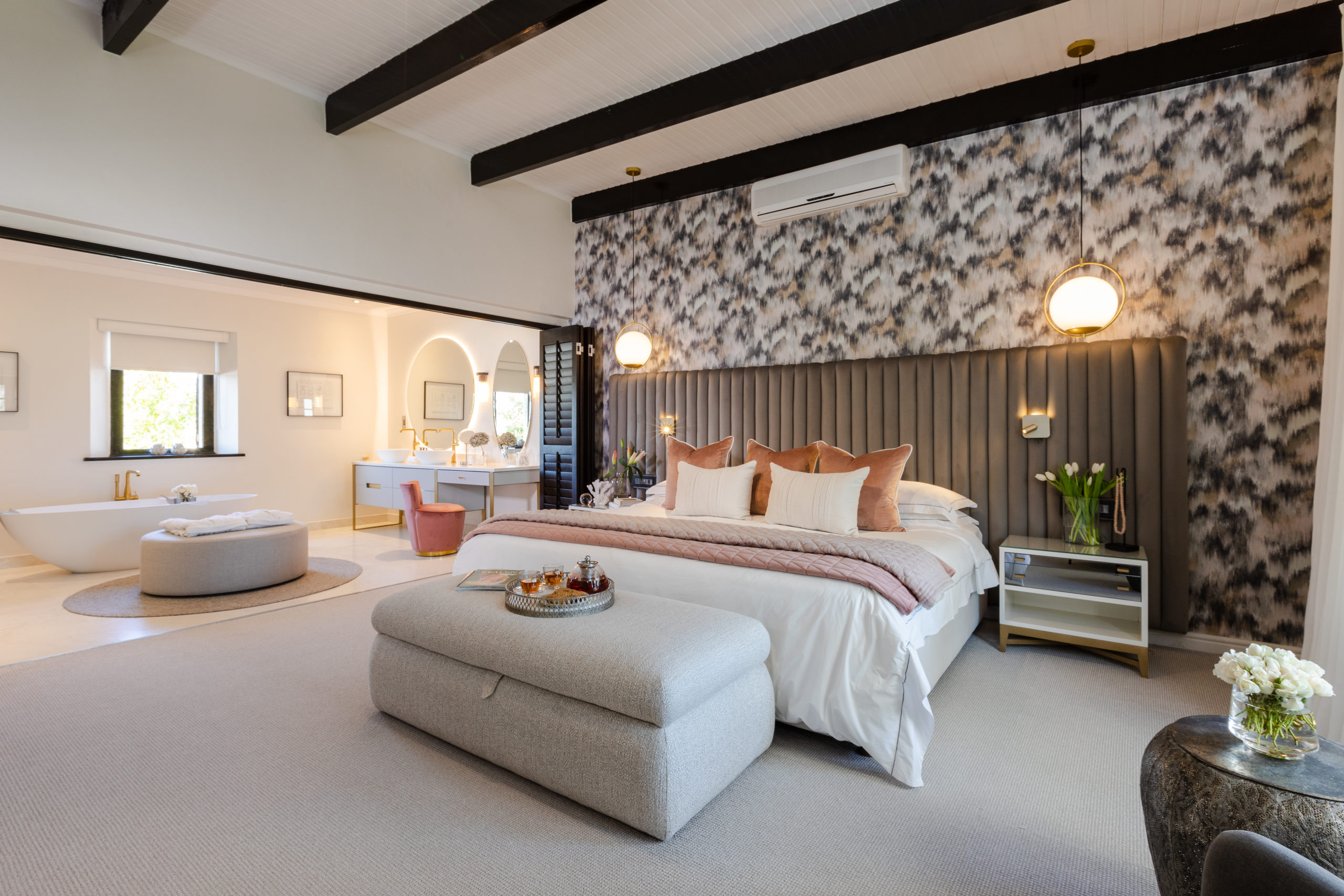
One of the beautifully refurbished rooms at Steenberg Hotel, a project that was completed in 2019. (Photo: Supplied)
Being a small hotel, and having a flexible team all trained in various skills, meant Steenberg could minimise the risk to them and to guests, when first opening for business travel. Occupancy has increased now of course. The layout is quite spread out, and with private patios and some in-room facilities it could almost be “self-catering”. Both restaurants on the estate, Tryn and Bistro Sixteen82, are open now, and wine tasting as well.
“As a boutique hotel, it has always lent itself to a service which is curated around the guests’ needs so nothing has changed in that arena. There are some services which we are so accustomed to doing but have had to adapt for the safety of all – like parking of guests’ cars on arrival, and turndown,” said Schulze.
“Our check-in process and all requests and requirements are done before arrival, including the Covid questionnaire. All staff have done training prior to being placed on shift by our Covid Officer (a newly created position in this period to ensure all are adhering to the correct regulations and that this is strictly monitored).
“Guests have their temperature taken, and at the spa a register is filled in by all guests. Housekeeping services are limited and rooms are fogged after every stay and then left for 24 hours to ensure the highest level of control. All refreshments and additional toweling are placed in the room before arrival so that guests have sufficient supply in the event they need to prevent any staff coming into the room.
“As far as servicing of rooms, we are following what our guests want and need, which differs depending on them. All linen is placed in secured bags and this is then sent directly to the laundry company which washes it at a very high temperature. We have as little contact with anything coming out of the rooms as possible. We have never had a tray charge for room service but most guests are opting to eat at Tryn. What we are experiencing is increased use of our areas for morning and afternoon walks by all our guests and our gardens.”
This I can vouch for, having taken some lovely strolls on the property, which also has a golf course. There’s a small dam with the most amazing view of False Bay and you don’t even need proper hiking boots to get there.
“Every person in service is dying to delight their guests, so you should be experiencing the best of everything at the most affordable prices – and feel fantastic that you’re supporting jobs,” said Schulze.
Pierre Van Heerden, programme coordinator and senior lecturer at The Private Hotel School – Rosebank says they are working “very closely” with the hospitality industry on reopening to leisure travellers. According to Van Heerden, the most prominent changes to take place in the hospitality industry will revolve around hygiene practices.
“With the reopening of leisure travel, it has increased the risk of spreading the virus. I can however say that wearing a mask is non-negotiable, and having sanitisers available for your staff and guests is a must,” he said.
“We must be extremely cautious to ensure that the rise in positive cases are controlled and that we are not pushed back to the higher levels, and our industry is shut down again. We have thousands of people that have lost incomes due to this pandemic. We need to rebuild this industry, and assist where training is needed.”
Despite all the guidelines, advice and training, there are still so many areas which remain fuzzy. As Selby said, table clothes are a thing of the past, and I heard the same from a restaurateur last week. Mere hours later, I walked past tables set up on a stoep – with clothes, condiments and cutlery.
“Being an overthinker and slight germaphobe, I would feel more comfortable with a bare table. The reasoning behind this is that I would have a greater ease of mind knowing that my table is clean, especially if the waitron sanitises it before you sit down,” shared Van Heerden. If the table is set with a tablecloth, decorations on the table etc, there would be a greater opportunity for missing a spot when cleaning/sanitising.
“Creating awareness is a powerful tool to use. Explain to your guests why the items on the table are minimal, and that it is for their safety. I have been to a few restaurants in Sandton and Parkhurst and have also had mixed experiences regarding this. I honestly can say that I felt a lot more comfortable with the restaurants that usually would have table cloths and flower arrangements on the tables that have removed these and have their cutlery in a sealed container (preferably biodegradable) because I know that the chance of these items being contaminated is less.
“There is no rule that states you have to remove the condiments of the tables. However, I do not see the purpose of leaving it on the table, if you need to sanitise it after each guest has used it. Guests will remove their masks while dining, and when speaking there will naturally be tiny particles of saliva that would be spread, thus we social distance. These particles would remain on the table, condiments etc for the next guest to touch.”
Erring on the side of caution should be the order of the day, and you can never go too far, said Van Heerden. “You should pride yourself on the measures you have put in place to keep your guests safe. Hygiene and safety has always been in the back of people’s minds and has now been brought to the forefront of people’s attention. Good hygiene and good safety only brings assurance to guests staying at your establishment, thus it is an added advantage of the experience. No guest would be able to fully relax on a beach vacation if they know that the necessary precautions have not been taken when it comes to the Covid pandemic, or safety in general.”
Van Heerden pointed out that travellers should prepare themselves for delays, and to be patient. “With all the regulations regarding temperature checking, contact tracing and additional sanitation there could be delays when it comes to entering the facilities, and checking into your room.”
Some larger hotel groups provide guests with a welcome “wellness” kit for personal use, and their luggage would also be sanitised on arrival before it is taken into the hotel.
High touch points, (lift buttons, hand railings etc.) would be sanitised multiple times a day, and more often than in the past, said Van Heerden, who is a Covid Compliance Officer, an extremely stressful job.
“You are solely responsible for everything in the facility. You need to ensure social distancing is taking place, and that all the relevant documentation is in place and recorded in accordance with legislation. It is the Covid Compliance Officer’s responsibility to ensure that any close contact cases and any positive cases are reported to the department of health.”
Although leaving a room vacant for 24 hours after checkout is not a regulation, it is recommended and “sensible”. I know I’d certainly feel happier knowing that buffer existed.
“The time can be used to deep clean and extensively sanitise the room before the next guest checks in. Some larger property groups are doing this as an added safety precaution,” said Van Heerden. Keys and key cards, door handles, telephones, TV and air conditioning remotes all need to be thoroughly cleaned. One would hope this was always standard practice.
Besides being aware of all these potential biohazards, you should also be looking out for who is wearing a mask – we’re talking restaurant or hotel staff here, not the average moron on the street.
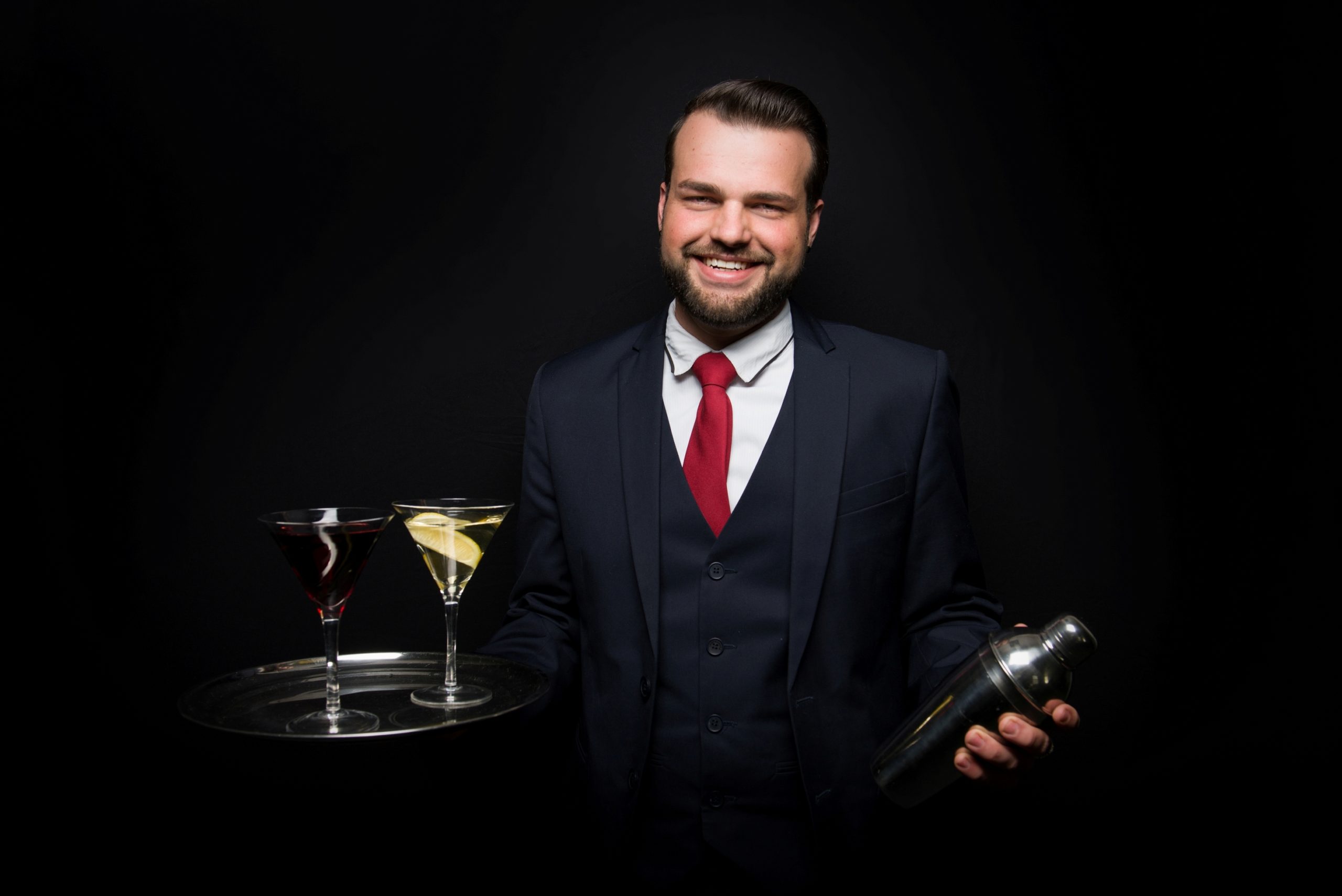
The most prominent changes to take place in the hospitality industry will revolve around hygiene practices, says Pierre van Heerden, The Private Hotel School – Rosebank. (Photo: Supplied)
“I was in a coffee shop a few weeks ago, and while waiting for my coffee the manager walked out from his office to address the barista with no mask on. Wearing a mask is a clear regulation,” said Van Heerden.
“Being an internationally trained chef myself I understand how challenging it can be to wear a mask in a hot, loud, and busy kitchen. This is a non-negotiable requirement for me. Thus, if you are dining in a restaurant with an open kitchen, pay close attention to what is happening in the kitchen.”
The Private Hotel School is part of the Independent Institute of Education (IIE) and ADvTECH Group and has been prepared for the return of its students. “We have done training with every single staff member and student that has returned to campus, and are extremely proud to say that we have no active positive Covid cases on our campuses,” said Van Heerden. “This is a direct reflection of the protocols that we have put in place, and how seriously we are taking the health and safety of our staff and students.”
Which goes to show, by exercising proper and effective prevention methods, transmission of the virus can be controlled within the hospitality environment, and we can all breathe a little easier. DM/TGIFood





 Become an Insider
Become an Insider
Comments - Please login in order to comment.